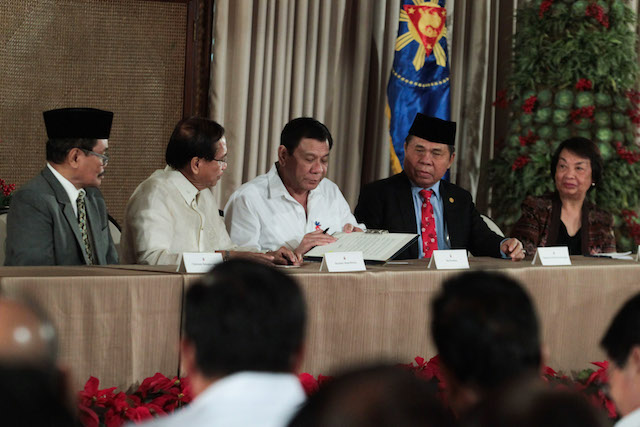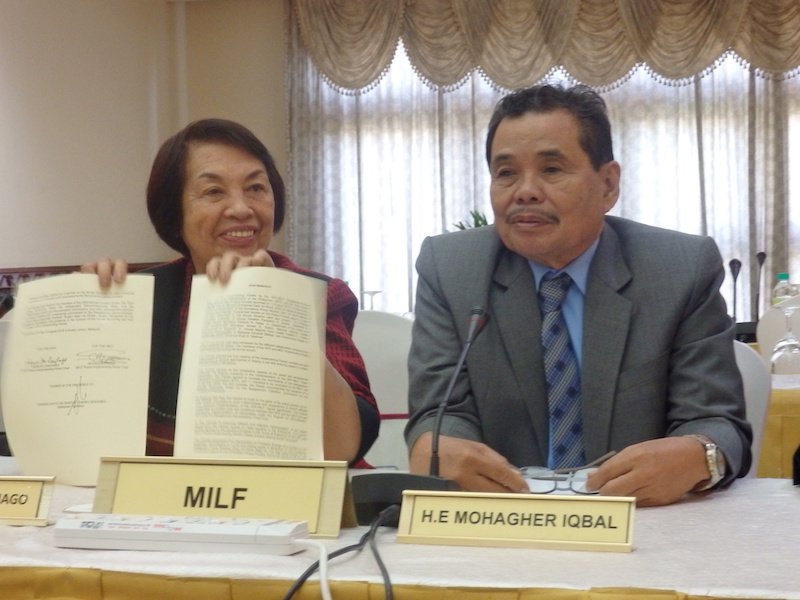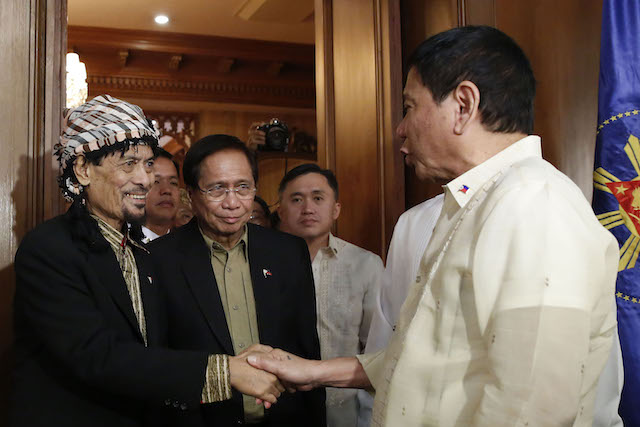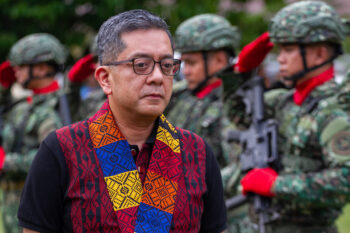DAVAO CITY (MindaNews / 08 February) — Only five months left to July when the 21-member Bangsamoro Transition Commission (BTC), according to the Duterte administration’s peace roadmap, is supposed to submit its draft Bangsamoro Basic Law (BBL) to Congress. As of February 8, however, the BTC has yet to be set up.
Presidential Adviser on the Peace Process Jesus Dureza told MindaNews on January 10 that President Rodrigo Duterte had signed the appointment papers of the BTC members on January 9 and that these would be “released shortly” so work could begin immediately.
“Shortly” has taken a month, and every month’s delay is also a month taken away from the now already very short drafting period (the Bangsamoro Peace and Development Roadmap which targeted July 2017 for submission of the draft BBL was approved by President Duterte on July 18, 2016).
 President Rodrigo Roa Duterte signs the Executive Order reconstituting the Bangsamoro Transition Commission in Malacañan on November 7, 2016. Also in the photo are Moro Islamic Liberation Front (MILF) Peace Implementing Panel chair Mohagher Iqbal, Presidential Peace Adviser Jesus Dureza, MILF Chair Al Haj Murad Ebrahim, and Government of the Philippines (GPH) Peace Implementing Panel chair Irene Santiago. KING RODRIGUEZ/Presidential Photo
President Rodrigo Roa Duterte signs the Executive Order reconstituting the Bangsamoro Transition Commission in Malacañan on November 7, 2016. Also in the photo are Moro Islamic Liberation Front (MILF) Peace Implementing Panel chair Mohagher Iqbal, Presidential Peace Adviser Jesus Dureza, MILF Chair Al Haj Murad Ebrahim, and Government of the Philippines (GPH) Peace Implementing Panel chair Irene Santiago. KING RODRIGUEZ/Presidential Photo
On February 7, Dureza told MindaNews the appointments have been completed and “hulat pa ta release from the Palace (let’s wait for the release from the Palace).
Four days earlier, when MindaNews followed up on the status of the appointments,
Dureza said, “we have to get the (appointment papers of the) full 21 before we release.”
MindaNews learned that initially, the release of the papers was delayed because one supposed appointee had to be replaced due to a pending court case.
The appointment of at least two commissioners was reportedly questioned, one supposedly for not being qualified, having lost in the May 2016 elections.
Dureza declined to comment. “Hulat na lang gyud ta official release,” (Let’s just wait for the official release), he said on February 8.
Delayed
Under the Duterte administration’s Bangsamoro Peace and Development Roadmap, the expanded BTC is supposed to submit the draft basic law by July 2017, before the President delivers his second State of the Nation Address on July 27.
But no draft could be started because three months after Duterte signed Executive Order No. 8 expanding the BTC membership on November 7, the BTC has not been set up.
Even the signing of the EO also took so long: three months from August, when the government (GPH) and the Moro Islamic Liberation Front (MILF) formally launched in Kuala Lumpur the Duterte administration’s implementation phase of the GPH-MILF peace process.
 Irene Santiago, chair of the government’s peace implementing panel shows the two-page joint statement she signed with MILF’s peace implementing panel chair Mohagher Iqbal on August 14, 2016 during the launch of the implementation phase of the GPH-MILF peace process in Kuala Lumpur. MindaNews file photo by CAROLYN O. ARGUILLAS
Irene Santiago, chair of the government’s peace implementing panel shows the two-page joint statement she signed with MILF’s peace implementing panel chair Mohagher Iqbal on August 14, 2016 during the launch of the implementation phase of the GPH-MILF peace process in Kuala Lumpur. MindaNews file photo by CAROLYN O. ARGUILLAS
A major part in the implementation phase of the GPH-MILF’s 2012 Framework Agreement on the Bangsamoro (FAB) and the 2014 Comprehensive Agreement on the Bangsamoro (CAB) is the passage of the BBL that would pave the way for the establishment of the Bangsamoro, a new autonomous political entity that will replace the 27-year old Autonomous Region in Muslim Mindanao (ARMM).
The passage of the law is also tied up with the normalization process, including the four phases of the decommissioning of MILF weapons and combatants. Only 55 high-powered and 20 crew-served weapons and 145 members of the MILF’s armed wing have been decommissioned in ceremonial rites held in June 2015.
Like the Aquino administration, it’s a race against time again for the Duterte administration because the ARMM’s next election is on May 13, 2019, synchronized with the national elections. Ideally, that should be the election of the first set of officials of the Bangsamoro.
The CAB provides for at least a year’s transition into the regular Bangsamoro government, which means the Bangsamoro Transition Authority should be in place by June 30, 2018. The Commission on Elections needs six months to prepare for the plebiscite that would ratify the BBL. This means the BBL has to be passed by December 2017 at the latest.
Aquino time
Under the Aquino administration, the BTC was set up in February 2013, four months after the FAB was signed. The BTC submitted its draft to the Office of the President in April 2014, a draft that went through a long period of review and more negotiations until the “agreed version” was submitted on September 10 that same year.
The House of Representatives’ Ad hoc Committee on the Bangsamoro Basic law headed by Cagayan de Oro Rep. Rufus Rodriguez immediately set committee hearings in Manila and Mindanao by October 2014 while the Senate Committee on Local Governments headed by Senator Ferdinand Marcos, Jr. followed later.
By January 2015, however, when the committee hearings were supposed to have been wrapping up so that deliberations at the plenary could begin, the January 25 Mamasapano Tragedy happened, unleashing a wave of anti-Moro sentiments that affected congressional deliberations and public support, further delaying the passage of the law.
Congress under the Aquino administration adjourned in February last year without passing the BBL.
At that time, the BTC was composed of 15 members, eight from the MILF and seven from the GPH. It was chaired by Mohagher Iqbal, also the MILF peace panel chair.
15 to 21
The Duterte administration increased the number of BTC members from 15 to 21 — 11 from the MILF and 10 from the GPH — supposedly to make it “more inclusive” and ensure the factions of the Moro National Liberation Front (MNLF) are represented.
The MNLF signed the Tripoli Agreement of 1976 with the government under then President Ferdinand Marcos and the Final Peace Agreement in 1996 under the Ramos administration.
Three of the government nominees in the BTC are from the MNLF faction under Muslimin Sema. In November, Dureza said the MNLF under founding chair Nur Misuari will have a separate peace implementing panel.
The MNLF-Misuari peace implementing panel headed by Randolph Parcasio and the government panel chaired by Nabil Tan acknowledged to MindaNews that they have had informal meetings but no formal meeting has been convened as of February 6.
The two panels are also supposed to submit to Congress by July this year its proposed amendments to RA 9054, the law governing the ARMM.
Misuari’s provisional liberty
Misuari, who had pending warrants of arrest for rebellion and crimes against International Humanitarian Law following the September 2013 Zamboanga siege, was granted provisional liberty in late October 2016 for a period of six months, to allow him “to attend peace talk sessions with the government.”
 President Rodrigo Duterte welcomes Moro National Liberation Front (MNLF) founding chair Nur Misuari in Malacañang on November 3, 2016. Presidential Adviser on the Peace Process Jesus Dureza (center) fetched Misuari from Sulu to meet the President. RICHARD MADELO/ Presidential Photo
President Rodrigo Duterte welcomes Moro National Liberation Front (MNLF) founding chair Nur Misuari in Malacañang on November 3, 2016. Presidential Adviser on the Peace Process Jesus Dureza (center) fetched Misuari from Sulu to meet the President. RICHARD MADELO/ Presidential Photo
Judge Ma. Rowena Modesto-San Pedro of the Pasig Regional Trial Court in Pasig City granted the “motion to suspend proceedings and enforcement of warrants of arrest against Misuari” for a period of six months from October 27 “unless sooner lifted by the court.” The six-month provision liberty ends on April 27.
The original peace roadmap that Duterte approved in July last year was to expand the BTC by including the MNLF factions in it so that the draft BBL and the proposed amendments of the GPH-MNLF can be converged into one proposed law for submission to Congress.
But this configuration changed when the government set up a separate implementing panel for the MNLF faction under Misuari.
Dureza told MindaNews on Nov. 3 that the GPH-MILF and GPH-MNLF (Misuari) peace tracks “will somehow converge in Congress without converging in the process.”
The GPH-MILF will be working on setting up of the Bangsamoro that will replace the ARMM while the GPH-MNLF will be working on amendments to strengthen the ARMM.
Aside from the GPH-MILF and GPH-MNLF peace tracks, Congress has yet to deliberate on a third peace track that Duterte has been pushing for: the shift to a federal system of government. (Carolyn O. Arguillas / MindaNews)
